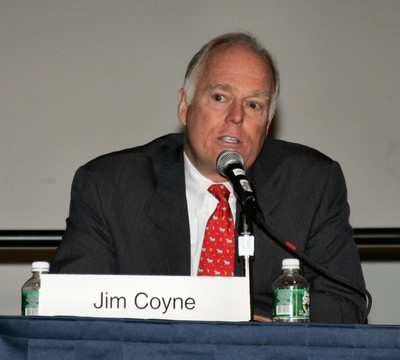Thu, Sep 23, 2010
James Coyne Testifies Before House Transportation
And Infrastructure Committee
 National Air Transportation Association (NATA) President James
K. Coyne testified Wednesday before the U.S. House of
Representatives Committee on Transportation and Infrastructure at a
hearing regarding Residential Through-the-Fence (RTTF) Agreements
at Public Airports. The FAA recently issued a proposed policy
regarding RTTF agreements at public airports. The policy would
subject existing RTTF agreements to closer oversight and prohibit
federally funded airports from entering into new RTTF
agreements.
National Air Transportation Association (NATA) President James
K. Coyne testified Wednesday before the U.S. House of
Representatives Committee on Transportation and Infrastructure at a
hearing regarding Residential Through-the-Fence (RTTF) Agreements
at Public Airports. The FAA recently issued a proposed policy
regarding RTTF agreements at public airports. The policy would
subject existing RTTF agreements to closer oversight and prohibit
federally funded airports from entering into new RTTF
agreements.
In his testimony, Coyne stated, "NATA agrees with the FAA that the
primary issue for not allowing new RTTF agreements is to ensure the
future utility of federally funded airports. Investments in
airports, made through the Airport Improvement Program or through
federal surplus property grants, are intended to enhance the
flexibility of airports to meet the future needs, in both capacity
and type of operations, of the National Airspace System. Due to the
intrinsic nature of residential properties, as compared to
commercial properties, RTTF agreements limit the flexibility of
airport sponsors to expand according to the needs of the community.
NATA believes that the FAA has made an overwhelming case for
prohibiting new RTTF agreements and supports its proposal."
Aviation Programs Manager for the Georgia Department of
Transportation Carol Comer also agreed with the FAA. "In the state
of Georgia, there are no RTTF agreements at any public-use
airport," explained Comer. "The state educates airport sponsors
that RTTF agreements are inconsistent with the airport's federal
obligation to ensure compatible land use adjacent to the airport
and reminds the sponsor that RTTF agreements may result in not
being able to receive any federal funding assistance due to
non-compliance with the airport's federal grant assurances."

File Photo
"Airport businesses, the majority of them small businesses,
invest billions of dollars in creating on-airport service
facilities that provide for the needs of the flying public," Coyne
stated. "Airport businesses are controlled by stringent oversight
by the airport sponsor to ensure their services support the needs
of the airport and the public. RTTF agreements reduce the future
purpose of the airport, which undermines the investment made by the
federal government and airport businesses."
Coyne concluded, "NATA believes that the FAA has proposed a
policy that well serves the long-term interests of public-use
airports, airport businesses and the public. Any attempt to
override that policy by statute could result in unintended
consequences that damage the future of the airport as well as the
future of all grant assurances."
More News
Pilot Also Reported That Due To A Fuel Leak, The Auxiliary Fuel Tanks Were Not Used On June 4, 2025, at 13:41 eastern daylight time, a Piper PA-23, N2109P, was substantially damage>[...]
Have A Story That NEEDS To Be Featured On Aero-News? Here’s How To Submit A Story To Our Team Some of the greatest new stories ANN has ever covered have been submitted by our>[...]
From 2023 (YouTube Edition): Reflections on War’s Collective Lessons and Cyclical Nature The exigencies of war ought be colorblind. Inane social-constructs the likes of racis>[...]
Aero Linx: Colorado Pilots Association (CPA) Colorado Pilots Association was incorporated as a Colorado Nonprofit Corporation in 1972. It is a statewide organization with over 700 >[...]
High Speed Taxiway A long radius taxiway designed and provided with lighting or marking to define the path of aircraft, traveling at high speed (up to 60 knots), from the runway ce>[...]
 NTSB Prelim: Piper PA-23
NTSB Prelim: Piper PA-23 ANN FAQ: Submit a News Story!
ANN FAQ: Submit a News Story! Classic Aero-TV: One Mans Vietnam
Classic Aero-TV: One Mans Vietnam ANN's Daily Aero-Linx (07.03.25)
ANN's Daily Aero-Linx (07.03.25) ANN's Daily Aero-Term (07.03.25): High Speed Taxiway
ANN's Daily Aero-Term (07.03.25): High Speed Taxiway




